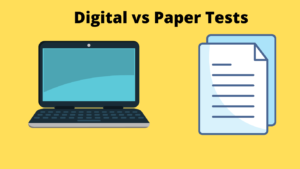Con:
May 16, 2022
Paper has been the dominant format for standardized testing for years, however, amid the pandemic, the College Board administered Advanced Placement (AP) exams digitally as well as several state-required tests. Now there is an argument for both sides regarding which format is optimal for test-taking,
Transitioning to digital formats would not only hurt students but give headaches to proctors of these exams.
For starters, online exams risk internet difficulties, speed issues, and security concerns that can prevent the test from being taken. This disproportionately affects low-income students who may not have the same access to technology as their peers. Digital test taking also increases the room for error as if the internet connection is not sufficient. In these cases, the test may not work or run smoothly. This issue is compounded by the fact that most standardized tests are timed..
We must also consider that some students cheat, even if proper measures are taken to minimize academic dishonesty. This can skew test scores and put students who follow the rules at a disadvantage.
When taking a paper test, a proctor monitors to make it extremely difficult for students to cheat, therefore putting everyone on equal footing.
On the other hand, if a proctor is present during a digital test. With taking a test through paper it is fairly simple to administer the test and leave no room for error. You present a student with instructions, pen, and paper and they can now take the test without the worry of error.
We also must consider that not all students are equally technologically proficient; if one does not know how to make use of a digital testing device, they could perform poorly on a test they might otherwise do well on.
Subjects like math should not be done digitally due to the fact most students complete math on paper already. Senior Mikaeel Nur feels that it’s complicated to do math digitally, he said.
“It is hard to plug [in] formulas on [the] computer and express my ideas how I want to,” Nur said.
Students already use digital devices for many hours in a day, whether that’s using their phones or completing assignments on their computer. A test would add around another two hours to personal time spent on electronics.
Students with processing difficulties may find it difficult to complete a test digitally as it is tough to go back and forth on an online test. Special Education English teacher Jesse Rutter feels that a paper test is more beneficial for these students.
“A lot of students have memory processing issues, when they have a hardcopy in front of them a lot of times it’s a lot easier to retrace their steps,” Rutter said.
Ultimately, it is most logical, efficient, and beneficial to stick with paper tests. Schools are always looking for ways to improve and advance, but in reality, the transition to digital tests would be taking a step back.





noah • May 7, 2024 at 2:02 pm
thank you bro bro